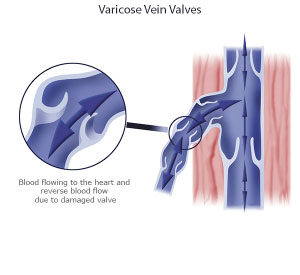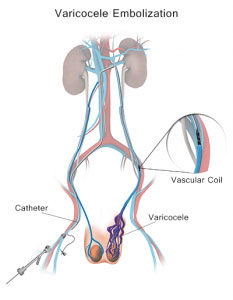
If you’ve been diagnosed with a varicocele and are experiencing issues with infertility, you may be looking for information about treatment options. If your doctor has recommended surgery, you’re probably wondering if this is the best – and only- approach for you.
 Before you decide on which varicocele treatment option is right for you, it’s important you learn a little bit more about varicoceles. Some basic facts:
Before you decide on which varicocele treatment option is right for you, it’s important you learn a little bit more about varicoceles. Some basic facts:
- Varicoceles, or dilated veins in the scrotum and around the testicles, are present in 15% of men.[i]
- A varicocele can cause 2 types of problems: discomfort and infertility.
- The discomfort may also be described as pain or heaviness in the scrotum or around the testicles.
- Infertility is diagnosed when a couple has been unable to become pregnant after 12 months of unprotected sex.
- Varicoceles are thought to play a role in infertility in about 35% of men with primary infertility.[ii]
If you are infertile due to a varicocele, it makes sense that you’re considering all of your options. Even if surgery has been recommended, you should know it may not be your only option for treatment.
Varicocele embolization is a minimally invasive alternative to surgery for the treatment of varicocele infertility. An interventional radiologist performs varicocele embolization using x-ray imaging to locate and treat the varicocele.
Do you want to learn more about the different types of varicocele surgery and compare them to varicocele embolization?
Varicocele Surgery & Infertility – Know the Details Before Deciding on this Treatment
Surgery for Varicocele Infertility
One of the main reasons men consider varicocele surgery is to treat infertility. Several conditions must be met in order for a surgeon, typically a urologist, to determine if varicocele surgery will be helpful. Varicocele surgery to treat infertility will likely be recommended if:
- The varicocele can be felt by the doctor.
- The definition of infertility has been met.
- The female partner has been evaluated by a fertility specialist and is considered fertile, or has a correctable cause of infertility.
- The male partner has low semen quality, count or abnormal sperm function.
Types of Varicocele Surgery
There are several different approaches to varicocele surgery. Ultimately, each option involves finding the affected blood vessels and tying them off to redirect blood flow and decrease the pressure within the veins.
- Open varicocelectomy requires an incision in the groin in order to gain access to the blood vessels causing the varicocele.
- Laparoscopic varicocelectomy involves several small incisions in the abdomen to allow for the introduction of specialized equipment, which includes a small scope, to visualize the blood vessels causing the varicocele. Once located and visualized the veins are then tied off. This approach requires the use of general anesthesia, meaning you’re completely unconscious and supported by a breathing machine during the surgery.
- Microsurgical varicocelectomy also requires an incision in the groin, like the open approach, but uses a microscope to get a better view of the blood vessels before tying them off. This procedure takes more time to perform than other approaches, but has a higher success rate.[iii]
The Risks of Varicocele Surgery
Any surgical procedure comes with risk. The risks that are specific to varicocele surgery include:
- Accidental damage to the blood supply to the testicles which can compromise their function.
- A hydrocele, a build-up of fluid that causes swelling in the scrotum, can form after the lymphatic flow has been disturbed by the surgery. This is more likely to occur after open varicocelectomy.
- The intestinal organs and blood vessels could be damaged during the laparoscopic approach.
- A varicocele may recur in up to 10% of men following surgery.[iii]
The Benefits of Varicocele Surgery
Varicocele surgery can lead to improved fertility in that it may achieve the following:
- Sperm count and sperm quality may improve.
- Testosterone levels may return to normal.
- Pain related to a varicocele may be improved.
- A couple may become pregnant. The pregnancy success rates after surgery range between 30 – 50%.[iii]
Before you Schedule Surgery, Consider Varicocele Embolization
Surgery may not be your only option. Varicocele embolization is a proven effective alternative to surgery for treatment of varicoceles. A minimally invasive procedure with a quicker recovery time as compared to surgery, more and more men are considering this outpatient procedure.
 Varicocele embolization is a procedure performed by an interventional radiologist; a doctor specialized in the use of x-ray technology to perform minimally invasive procedures. Varicocele embolization is performed using the following steps:
Varicocele embolization is a procedure performed by an interventional radiologist; a doctor specialized in the use of x-ray technology to perform minimally invasive procedures. Varicocele embolization is performed using the following steps:
- A small nick is made in the groin and a catheter, a thin tube, is inserted into the femoral vein.
- Using x-rays to visualize placement, the catheter is guided to the veins that are causing the varicocele.
- Once located, small coils and/or a solution that will decrease dilation are inserted into the veins through the catheter. Blood flow is then redirected away from the varicocele resulting in a reduction in the size of the veins of the varicocele.
While there is some risk associated with varicocele embolization, such as temporary pain in the side, movement of the coils out of position and recurrence of the varicocele, the embolization procedure is successful in treating varicocele infertility in about 90% of cases.[iii] Following varicocele embolization, with improved sperm count and motility, the rate of pregnancy is almost 50%.[iv]
If you are considering varicocele embolization as an alternative to surgery, you should find an interventional radiologist who specializes in the treatment of varicocele to review your medical history. Only your doctor and an interventional radiologist can help you determine if varicocele embolization will be the right treatment for you.
Sources:
i Choi, W., and Kim, S., Current Issues in Varicocele Management: A Review. World J Mens Health, 2013. 31(1): p. 12-20. http://wjmh.org/DOIx.php?id=10.5534/wjmh.2013.31.1.12 (accessed 7/31/2016)
ii Kovac, J. R., et al. (2014). Cost-effectiveness analysis reveals microsurgical varicocele repair is superior to percutaneous embolization in the treatment of male infertility. Can Urol Assoc J, 8(9-10), E619-25. Retrieved from http://www.ncbi.nlm.nih.gov/pubmed/25295133 (accessed 12/14/2016)
iii Kupis, L., Dobronski, P.A., Radziszewski, P., Varicocele as a source of male infertility – current treatment techniques. Cent European J Urol, 2015. 68: p. 365-370. http://www.ncbi.nlm.nih.gov/pmc/articles/PMC4643713/ (last accessed 7/31/2016)
iv Cantoro, U., Polito, M., Muzzonnigro, G., Reassessing the role of subclinical varicocele in infertile men with impaired semen quality: a prospective study. Urology, 2015, 85(4): p. 826-30. http://www.ncbi.nlm.nih.gov/pubmed/25817105 (accessed 8/4/2016)


